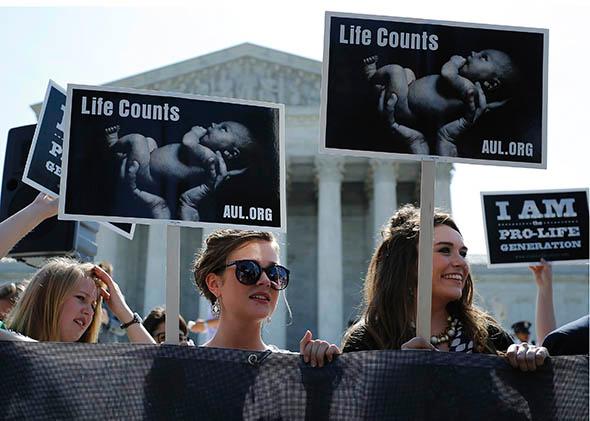I’m trying to hold fast to the fact that this is It Could Be Worse Day at the Supreme Court. Unions survived, and while Hobby Lobby and lots of (all?) for-profit companies now have religious rights they never had before, at least the court thinks they still have to provide insurance coverage that pays for vaccinations and blood transfusions. It’s only birth control that corporations can cross off the list, for a reason that even sounds benign: Since the Obama administration already accommodates churches and some religious groups that object to paying for certain kinds of birth control, they can just accommodate Hobby Lobby, too. No sincere-belief harm, no IUD foul.
And yet I’m tearing my hair out, like Dahlia and a lot of other women today, I’m sure. Eric, you say this case will contribute to the culture wars because Justice Ruth Bader Ginsburg framed it, in her dissent, as a choice between the rights of companies and the rights of women. She’s not making that up. Justice Samuel Alito says the government can just pay for birth control so that “zero” women who work for companies like Hobby Lobby will be affected. But he also would only “assume,” for the purposes of argument, that the government has a real interest in making sure comprehensive health insurance covers contraception. As the Institute of Medicine spelled out in a report for the Department of Health and Human Services, preventing unwanted pregnancies is of undeniable benefit to women.
The majority’s refusal to recognize that fact, full stop, proves a point Linda Greenhouse made in the New York Times last fall: This case is about sex. Or more specifically, it’s a rearguard action by the religious right to block the government from “putting its thumb on the scale in favor of birth control, of sex without consequences.” Read the article Linda points to by Helen Alvaré, a law professor and longtime adviser to the National Conference of Catholic Bishops. Or read these amazing quotes from some of the religious groups that swooped in on Hobby Lobby’s side. These people and ideas won today.
“Our decision in these cases is concerned solely with the contraceptive mandate,” Alito wrote. “Other coverage requirements, such as immunizations, may be supported by different interests (for example, the need to combat the spread of infectious diseases) and may involve different arguments about the least restrictive means of providing them.” Isn’t it convenient how matters of reproductive health can somehow be neatly separated from the rest of medicine? Once walled off, it’s so much easier to decide that the interests of women in birth control (and abortion) lose out to somebody else’s interest in something else.
To give Hobby Lobby its victory, the court’s conservatives actually told the government to go spend more taxpayer money. Hey, Alito says, if Congress really thinks birth control is important, then it should go pay for it. That doesn’t sound like the core conservative principle of small government to me. “Where is the stopping point to the ‘let government pay’ alternative?” Ginsburg asks.
Larry, you’re right that Alito doesn’t really limit religious rights to “closely held” corporations. He just says that he doesn’t think publicly traded “giants” are likely to make religious claims. But that’s speculation: Companies have never had the tool the court just handed them before. Surely if it’s to their advantage, they’ll figure out how to use it. I’m reminded of the debate I had earlier in the spring with New York Times columnist Ross Douthat over our competing conceptions of religious liberty. My version recognizes religious rights that don’t trample all over other people’s rights. Douthat’s gives “dissenters” a way to refuse to bake cakes for gay weddings, to refuse to recognize equality as the rest of us, legally and socially, have come to define it. I still think that’s wrong. But my argument hinged in part on treating for-profit businesses differently from churches, and Alito and the conservatives just erased that distinction.
Congress could change this result. The Hobby Lobby case wasn’t about the First Amendment or the Constitution. It was about a law, the Religious Freedom Restoration Act, which Congress could rewrite. I know that’s not happening anytime soon, but it’s still worth pointing out.
I’ll close by mentioning just how well corporations are faring at the Supreme Court this term. The Constitutional Accountability Center has been keeping track and says the U.S. Chamber of Commerce has an 11–5 record before the court, bringing it to 32–8, or 80 percent, over the past three years. Dick, you’ve written a lot about this, so I wonder in particular what you make of those numbers. I’m thinking, meanwhile, about whether to change my mind about McCullen because of the fallout for abortion clinics that you reminded us of. It’s tempting! Especially on this day when the court’s conservatives have given us the shaft yet again.
Correction, July 1, 2014: This post originally misidentified the Institute of Medicine as the Institutes of Medicine.
